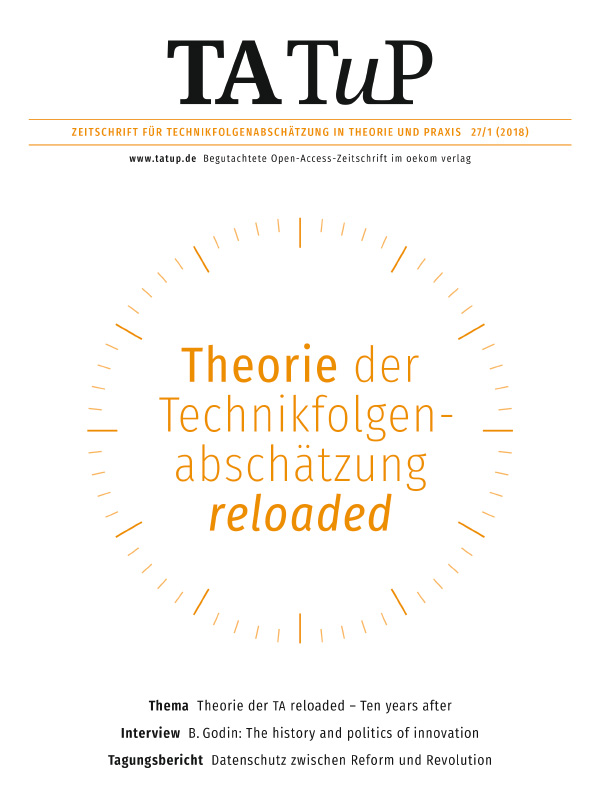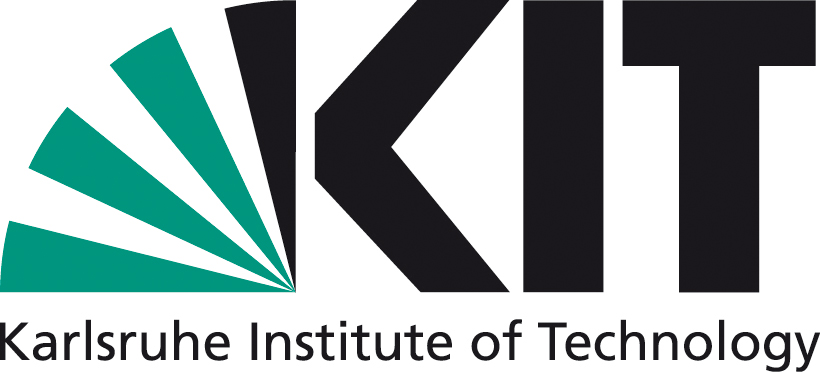The hidden fourth dimension
Normative reflexion as an extension for the theory of technology assessment
DOI:
https://doi.org/10.14512/tatup.27.1.21Keywords:
technology consequences, scientific policy advice, theory of technology assessment TA practiceAbstract
A decade ago, Armin Grunwald identified three elements as essential for a future theory of technology assessment (TA): assessing impacts, complying with scientific standards, and providing policy advice. However, the institutional contexts and tasks of today’s TA have diversified. Five on-going projects were assessed with regard to the three elements proposed. They appeared in some form in every project but followed diverging interpretations, which raises doubt whether they suffice to constitute a theory of TA. Here I argue for a fourth dimension to be added, namely the discussion of normative aspects.
References
Bauer, Anja; Bogner, Alexander; Fuchs, Daniela (2016): Societal engagement under the terms of RRI, Deliverable D2.2 for the EU-project PROSO – Promoting Societal Engagement under the terms of RRI. Wien: Institut für Technikfolgen-Abschätzung (ITA).
Bogner, Alexander (2011): Die Ethisierung von Technikkonflikten. Studien zum Geltungswandel des Dissenses. Weilerswist: Verlag Velbrück Wissenschaft.
Bogner, Alexander (2012): The paradox of participation experiments. In: Science, Technology & Human Values 37 (5), S. 506–527. DOI: https://doi.org/10.1177/0162243911430398
Decker, Michael (2007): Praxis und Theorie der Technikfolgenabschätzung. Erste Überlegungen zu einer methodischen Rekonstruktion. In: TATuP – Zeitschrift für Technikfolgenabschätzung in Theorie und Praxis 16 (1), S. 25–34. Online verfügbar unter http://www.tatup-journal.de/downloads/2007/tatup071.pdf, zuletzt geprüft am 15. 02. 2018. DOI: https://doi.org/10.14512/tatup.16.1.25
Decker, Michael (2013): Technikfolgen. In: Armin Grunwald (Hg.): Handbuch Technikethik. Stuttgart: Metzler, S. 33–38. DOI: https://doi.org/10.1007/978-3-476-05333-6_6
Dusseldorp, Marc (2013): Technikfolgenabschätzung. In: Armin Grunwald (Hg.): Handbuch Technikethik. Stuttgart: Metzler, S. 394–399. DOI: https://doi.org/10.1007/978-3-476-05333-6_75
Dusseldorp, Marc (2014): Technikfolgenabschätzung zwischen Neutralität und Bewertung. In: Aus Politik und Zeitgeschichte 6–7. Online verfügbar unter http://www.bpb.de/apuz/177757/technik-folgen-abschaetzung, zuletzt geprüft 13. 12. 2017.
Grunwald, Armin (Hg.) (1999a): Rationale Technikfolgenbeurteilung. Konzeption und methodische Grundlagen. Berlin: Springer. DOI: https://doi.org/10.1007/978-3-642-60032-6_2
Grunwald, Armin (2000): Technikfolgenabschätzung impliziert notwendigerweise Laienbeteiligung. Wirklich? Rezension von Skorupinski/Ott: Technikfolgenabschätzung und Ethik. In: TA-Datenbank-Nachrichten 9 (2), S. 98–102. Online verfügbar unter https://www.tatup-journal.de/downloads/2000/tadn002_grun00b.pdf, zuletzt geprüft am 15. 02. 2018. DOI: https://doi.org/10.14512/tatup.9.2.98
Grunwald, Armin (2007): Auf dem Weg zu einer Theorie der Technikfolgenabschätzung. der Einstieg. In: TATuP – Zeitschrift für Technikfolgenabschätzung in Theorie und Praxis 16 (1), S. 34–44. Online verfügbar unter http://www.tatup-journal.de/downloads/2007/tatup071.pdf, zuletzt geprüft am 15. 02. 2018. DOI: https://doi.org/10.14512/tatup.16.1.34
Grunwald, Armin (2011): Responsible Innovation. Bringing together technology assessment, applied ethics, and STS research. In: Enterprise and Work Innovation Studies 7, S. 9–31.
Gudowsky Niklas; Sotoudeh Mahshid (2017): Into blue skies. Transdisciplinary foresight and co-creation as socially robust tools for visioneering socio-technical change. In: NanoEthics 11 (1), S. 93–106. DOI: https://doi.org/10.1007/s11569-017-0284-7
Kastenhofer Karen; Bechthold, Ulrike; Wilfing, Harald (2011): Sustaining sustainability science. The role of established inter-disciplines. In: Ecological Economics 70 (4), S. 835–843. DOI: https://doi.org/10.1016/j.ecolecon.2010.12.008
Nentwich, Michael (2017): A short response to van Lente, Swierstra and Joly’s essay ‚Responsible innovation as a critique of technology assessment‘. In: Journal of Responsible Innovation 4 (2), S. 262–267. DOI: https://doi.org/10.1080/23299460.2017.1325698
Petermann, Thomas; Grunwald, Armin (2005): Technikfolgen-Abschätzung für den Deutschen Bundestag. Das TAB – Erfahrungen und Perspektiven wissenschaftlicher Politikberatung. Berlin: edition sigma.
Schomberg, René von (2011): Prospects for technology assessment in a framework of responsible research and innovation. In: Marc Dusseldorp und Richard Beecroft (Hg.): Technikfolgen abschätzen lehren. Bildungspotenziale transdisziplinärer Methoden. Wiesbaden: VS Verlag. Online verfügbar unter https://papers.ssrn.com/sol3/papers.cfm?abstract_id=2439112, zuletzt geprüft am 22. 12. 2017.
Skorupinski, Barbara; Ott, Konrad (2000): Technikfolgenabschätzung und Ethik. Eine Verhältnisbestimmung in Theorie und Praxis. Zürich: vdf Hochschulverlag. DOI: https://doi.org/10.14512/tatup.9.2.88
van Lente, Haro; Swierstra, Tsjalling; Joly, Pierre-Benoît (2017): Responsible Innovation as a critique of technology assessment. In: Journal of Responsible Innovation 4 (2), S. 254–261. DOI: https://doi.org/10.1080/23299460.2017.1326261
VDI – Verein Deutscher Ingenieure (2000): Richtlinie VDI 3780. Technikbewertung, Begriffe und Grundlagen. ICS 01.040.01; 01.040.03; 03.040.
van den Daele, Wolfgang (1993): Sozialverträglichkeit und Umweltverträglichkeit, Inhaltliche Mindeststandards und Verfahren bei der Beurteilung neuer Technik. In: Politische Vierteljahresschrift 34 (2), S. 219–248.
Weyer, Johannes (Hg.) (1994): Theorie und Praktiken der Technikfolgenabschätzung. Wien: Profil Verlag.
Wilsdon, James; Willis, Rebecca (2004): See-through science. Why public engagement needs to move upstream. Project Report, London: Demos.
Woopen, Christiane; Mertz, Marcel (2014): Ethik in der Technikfolgenabschätzung. Vier unverzichtbare Funktionen. In: Aus Politik und Zeitgeschichte 64 (6–7). Online verfügbar unter http://www.bpb.de/apuz/177771/ethik-in-der-technikfolgenabschaetzung?p=all, zuletzt geprüft am 22. 12. 2017.
Downloads
Published
How to Cite
Issue
Section
License
Copyright (c) 2018 Helge Torgersen

This work is licensed under a Creative Commons Attribution 4.0 International License.








